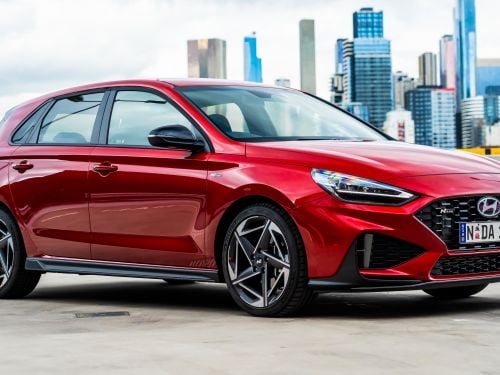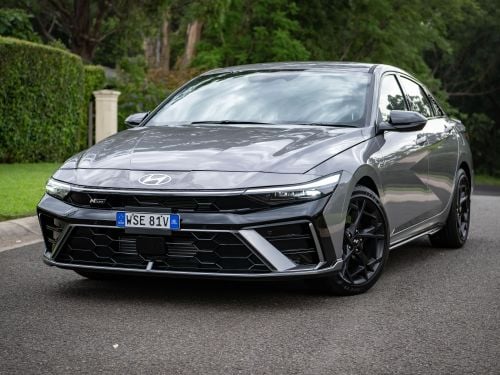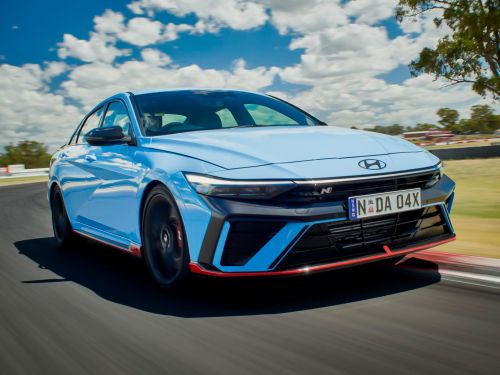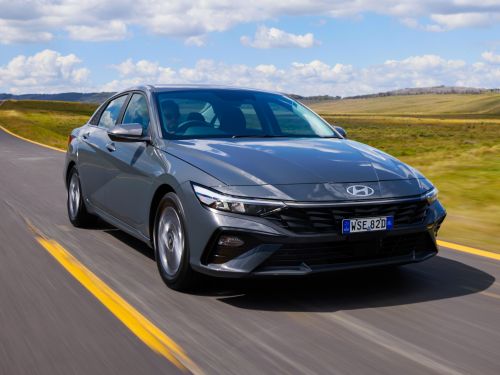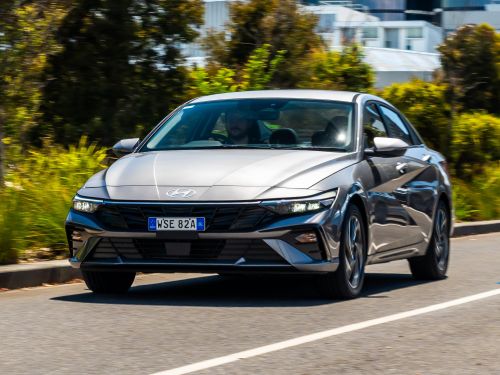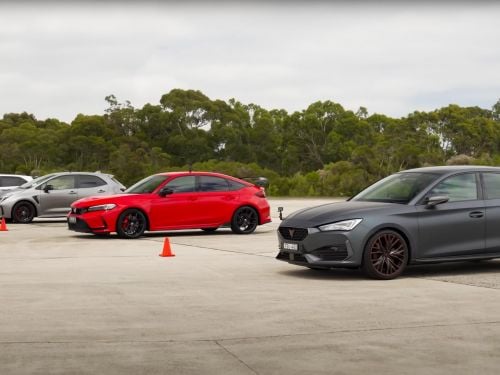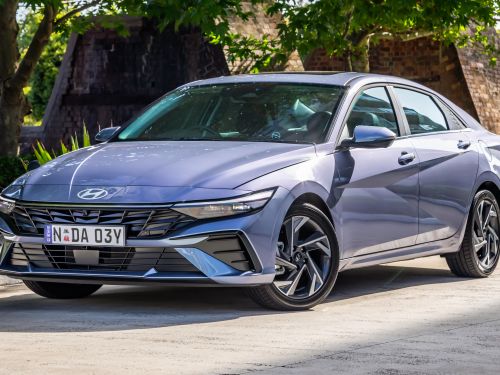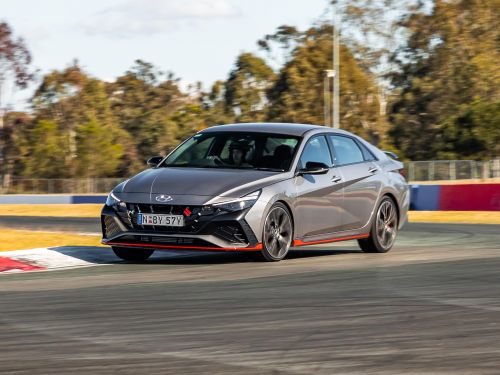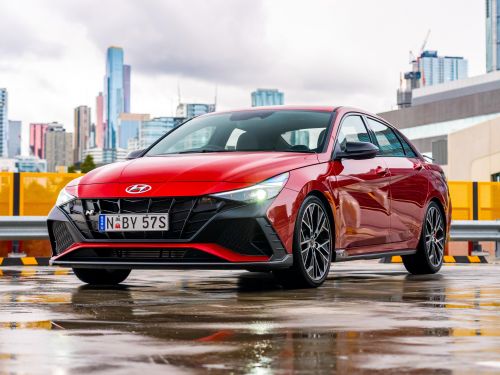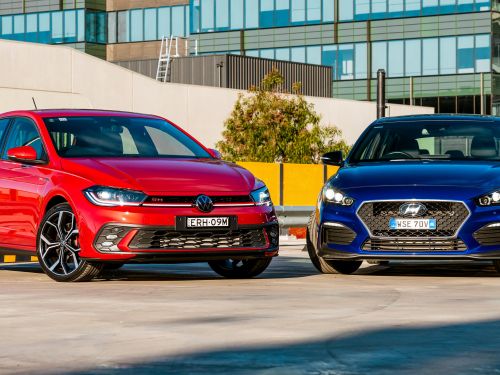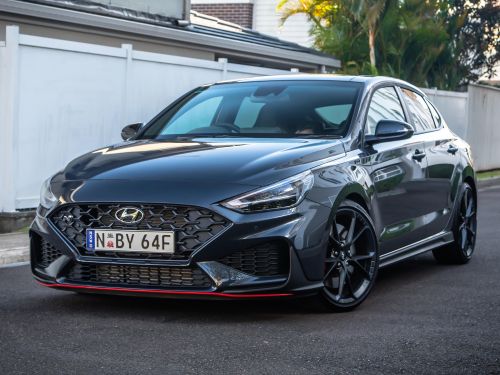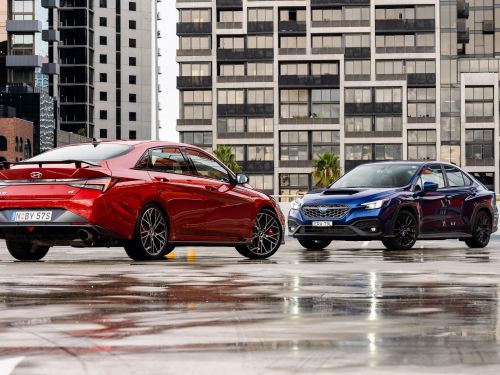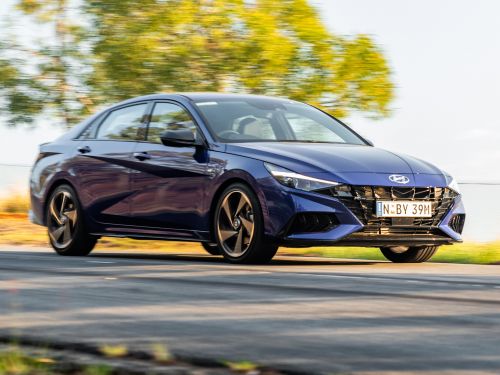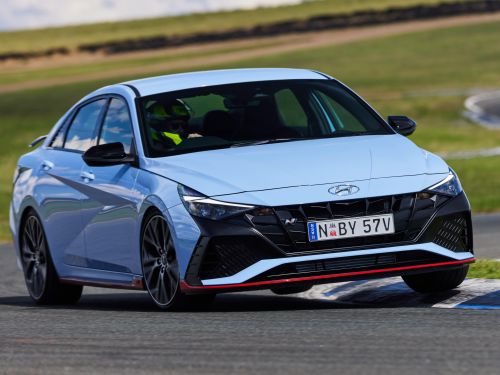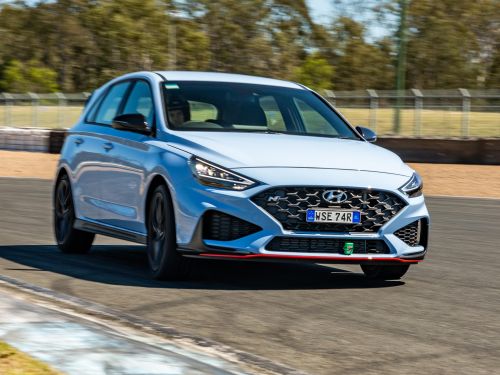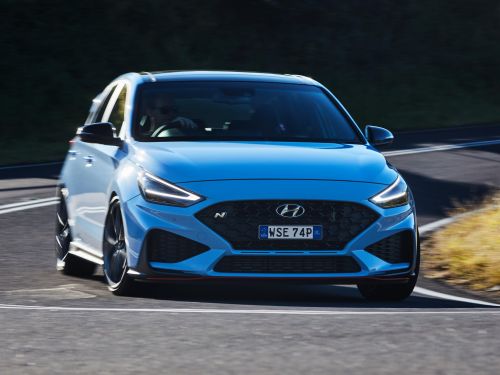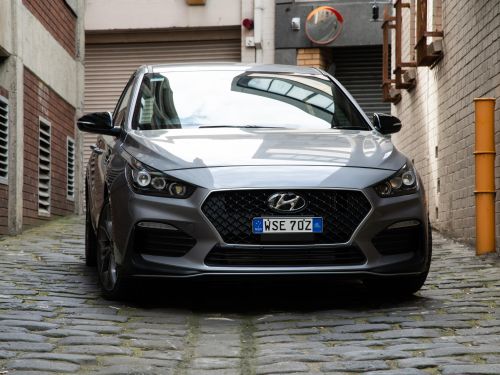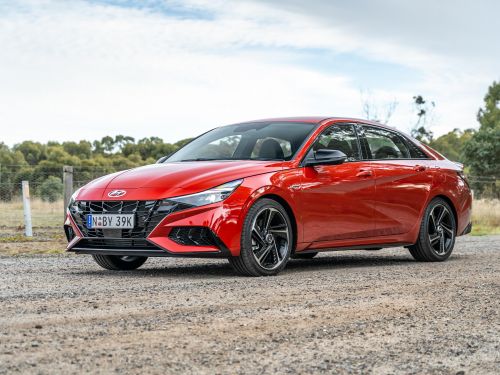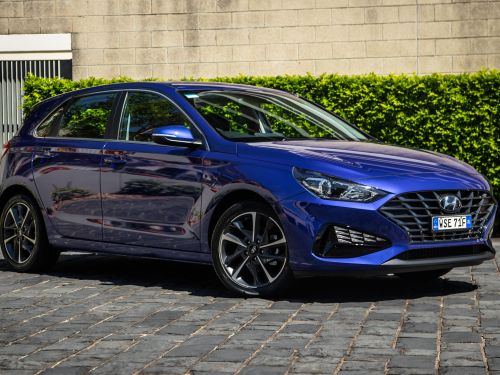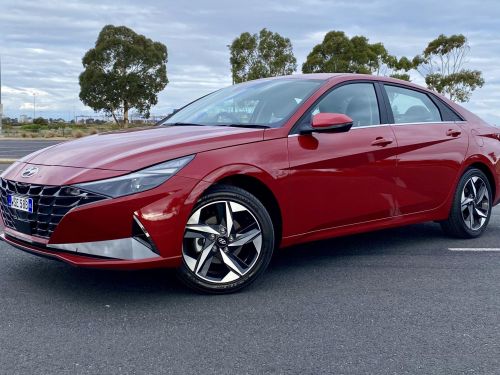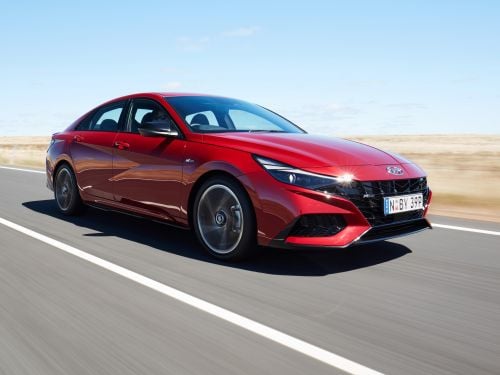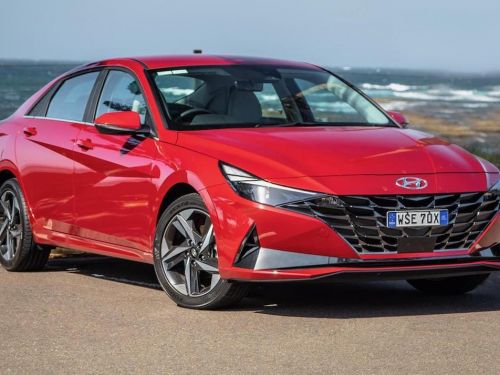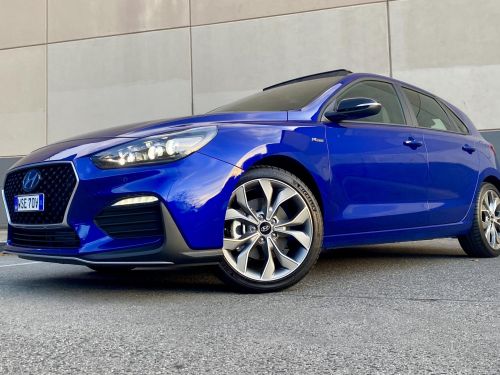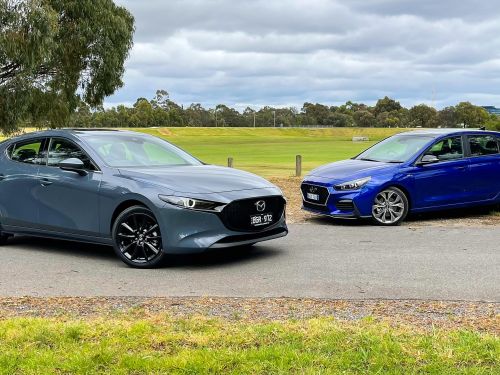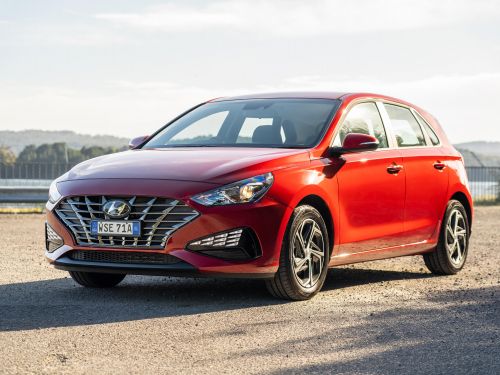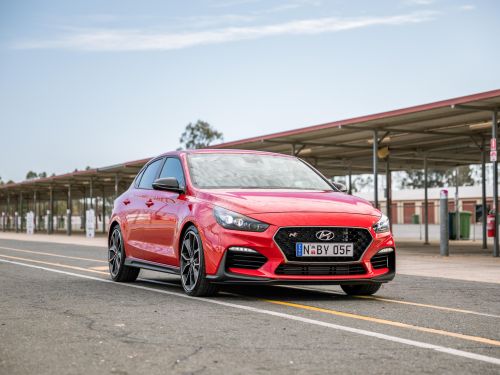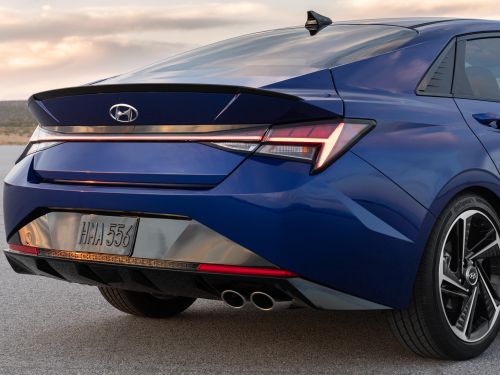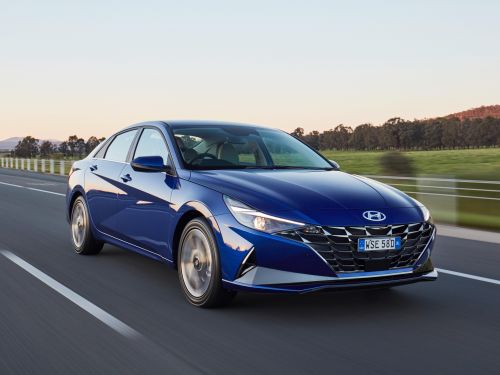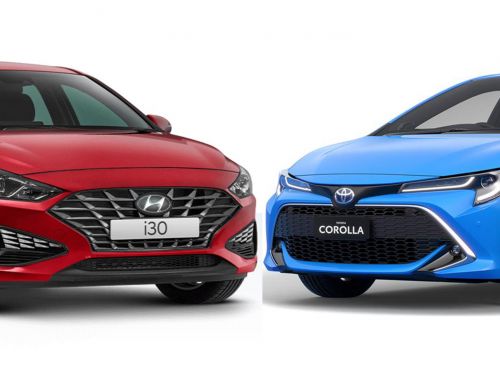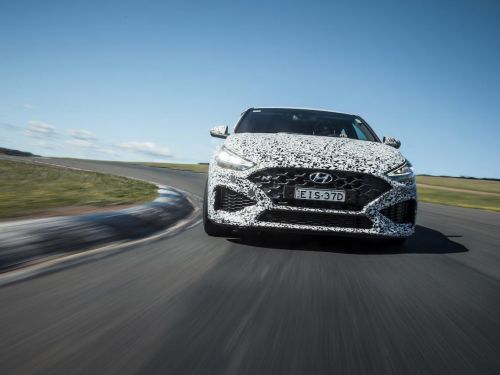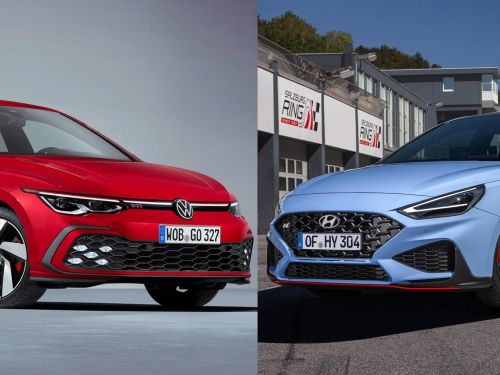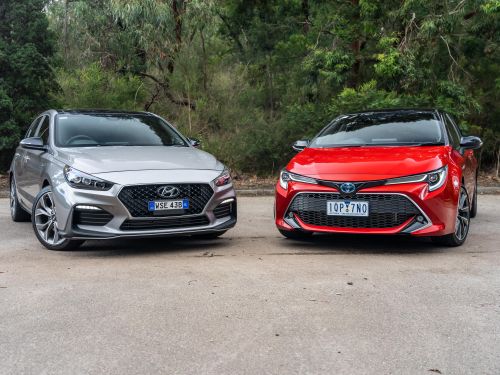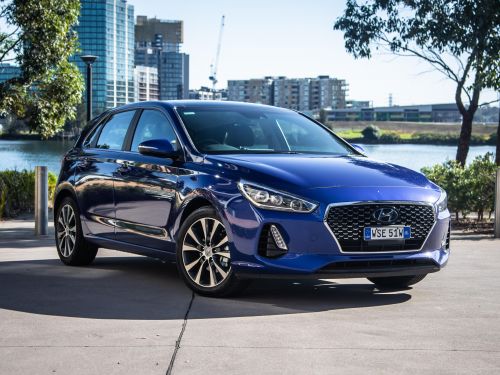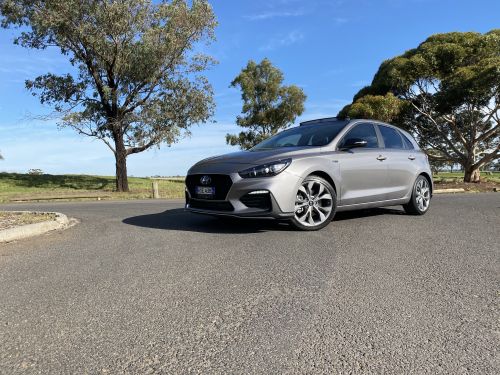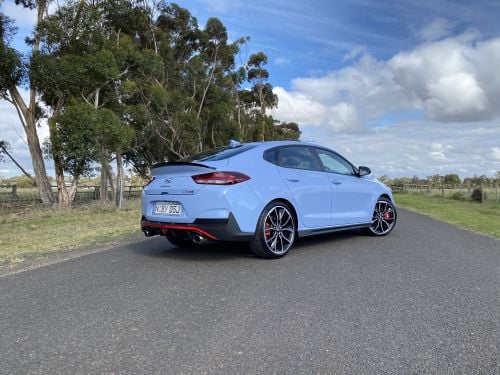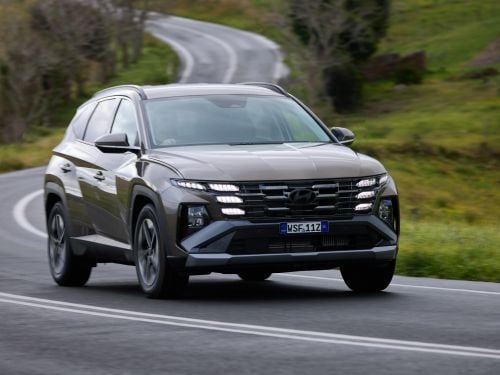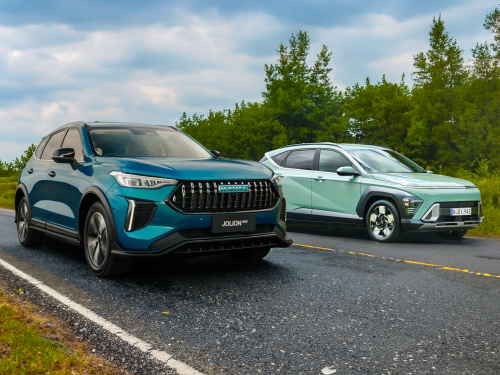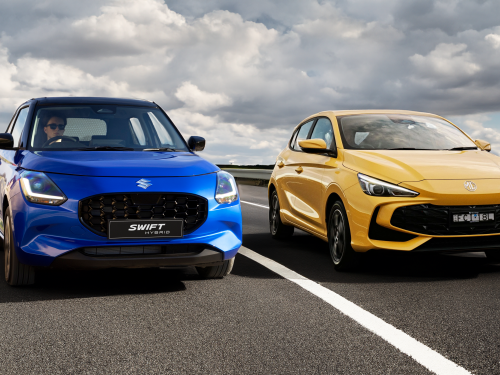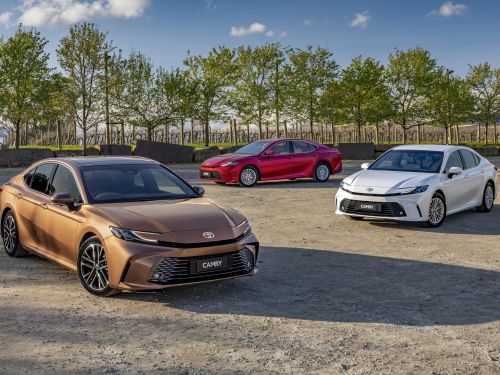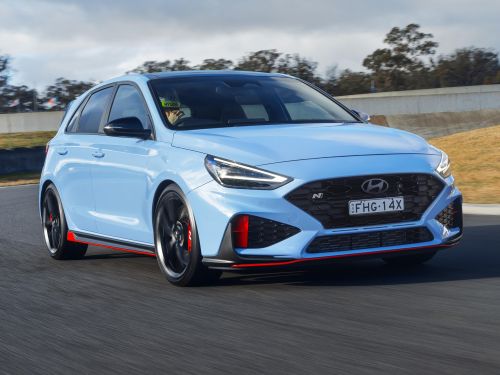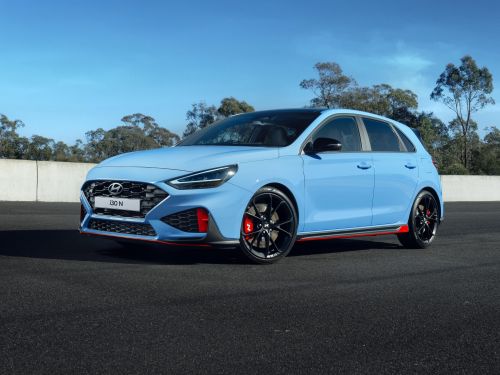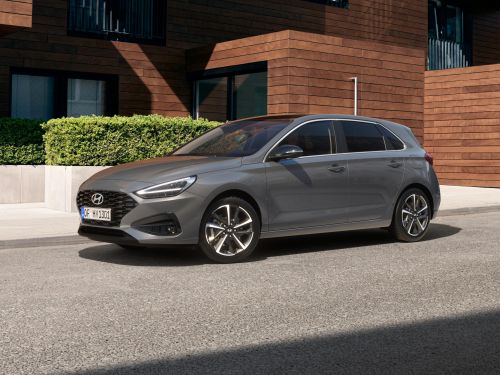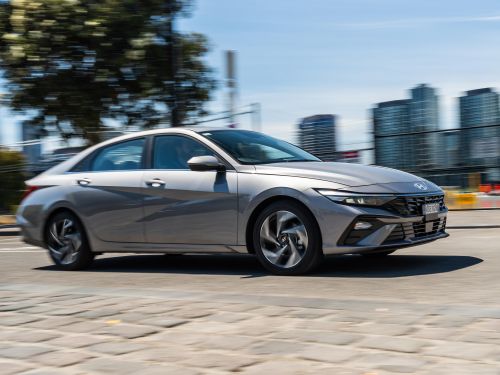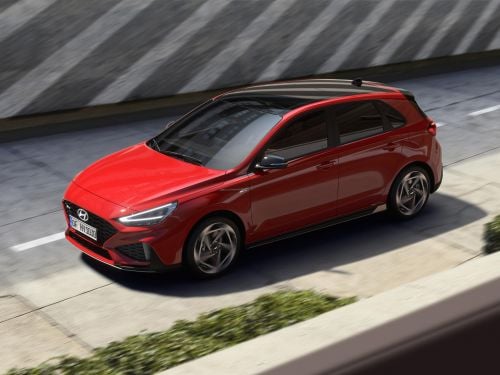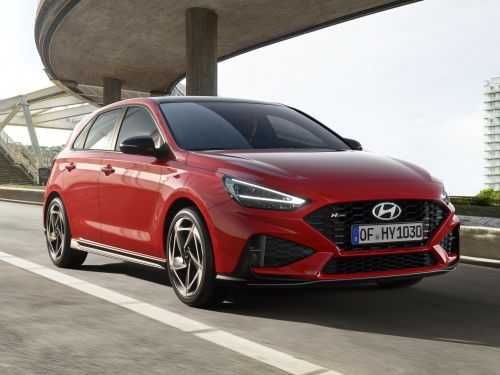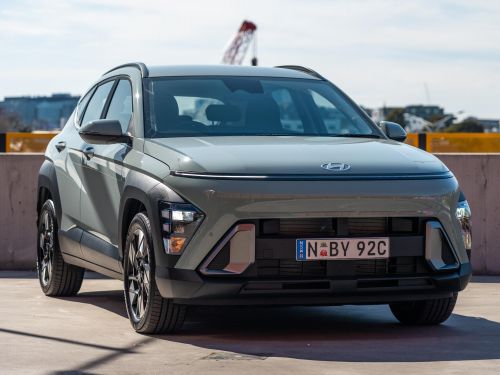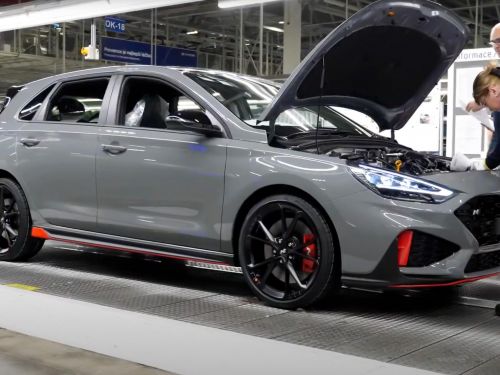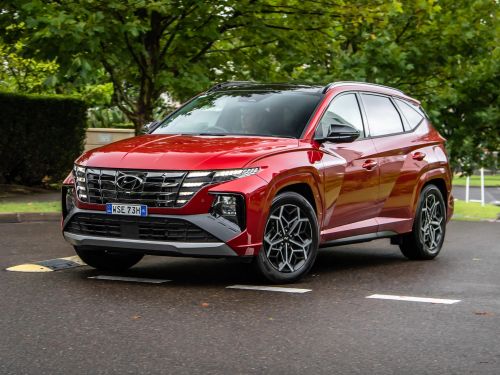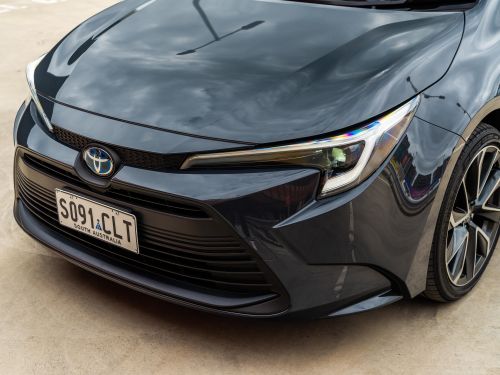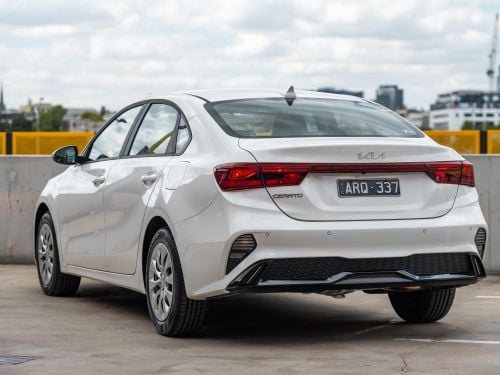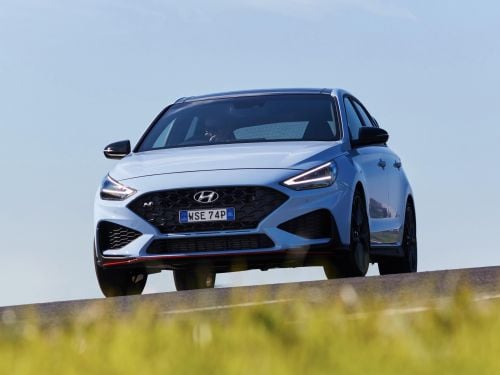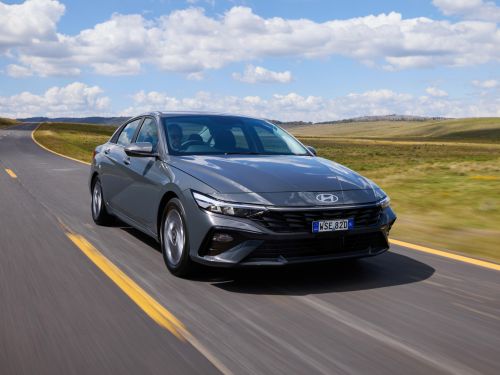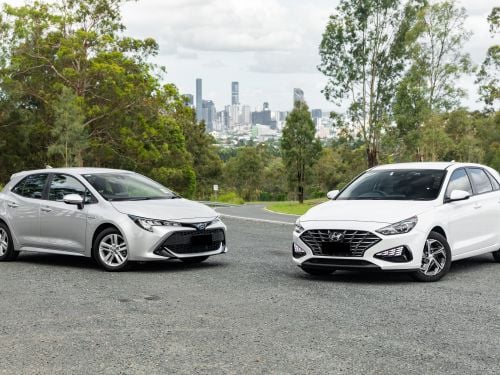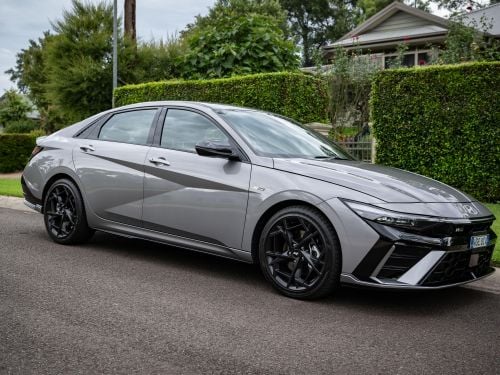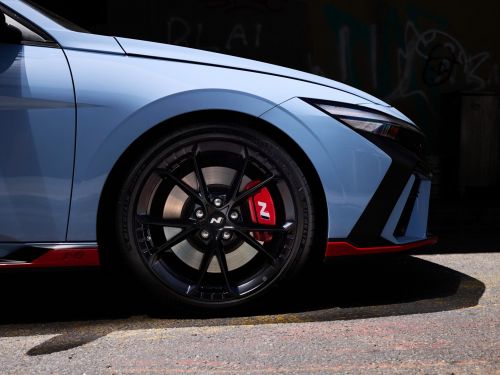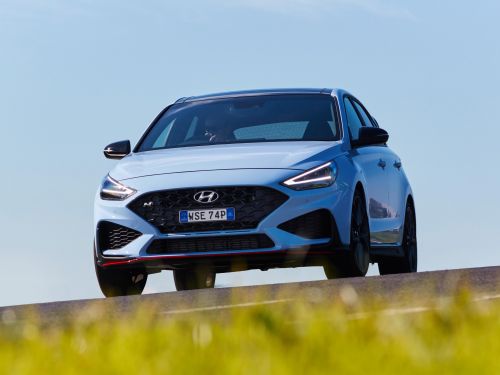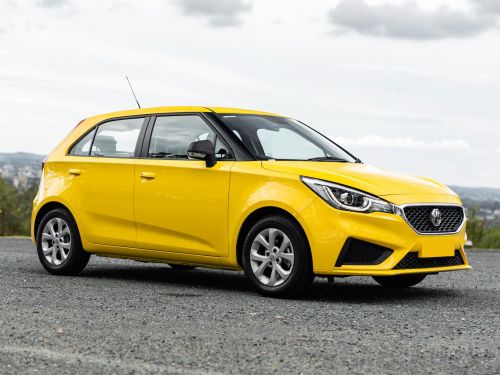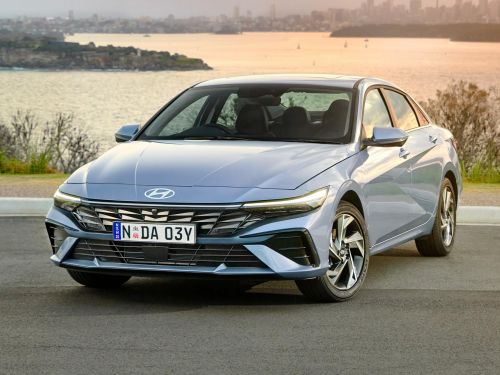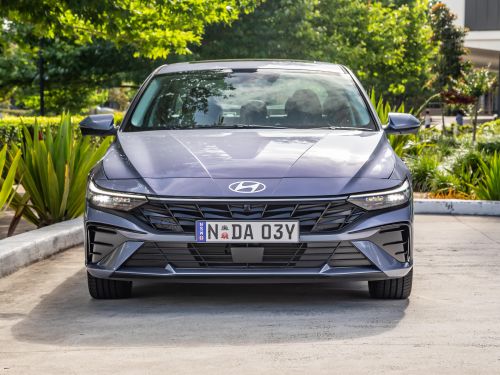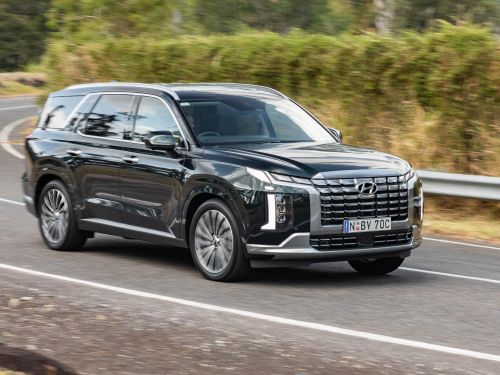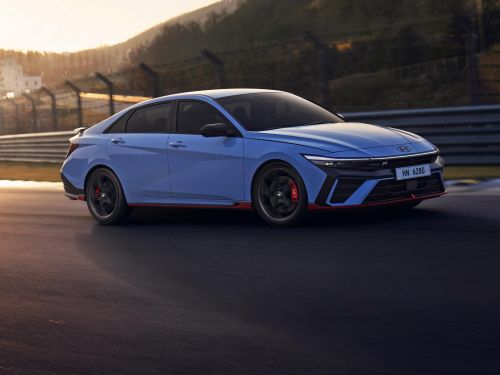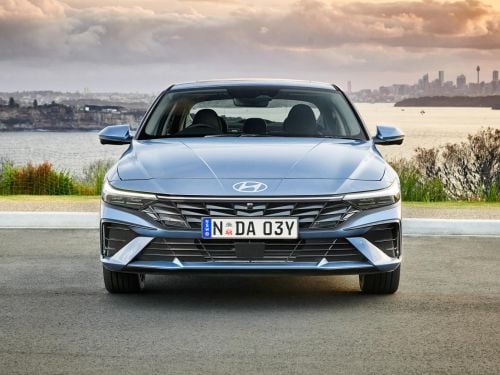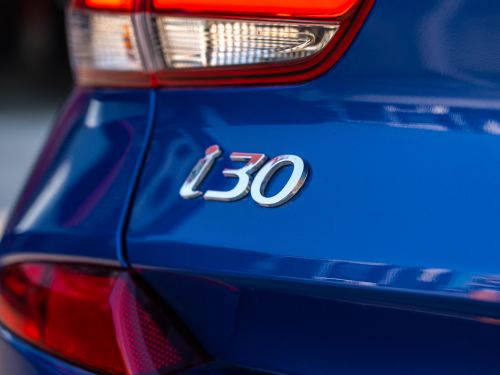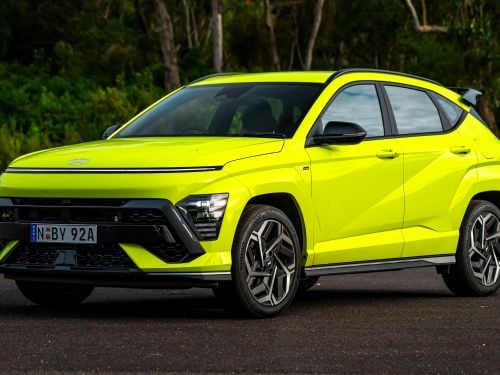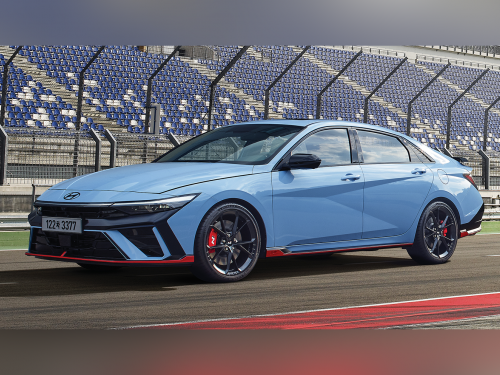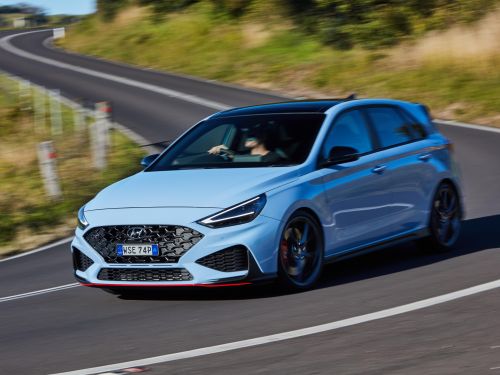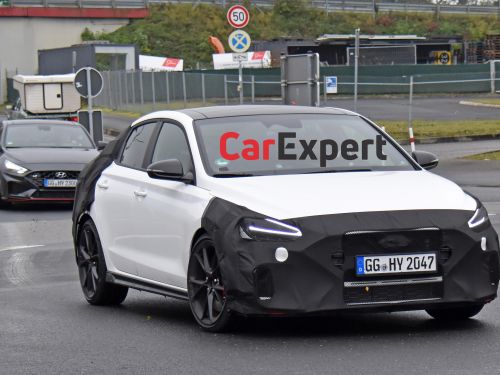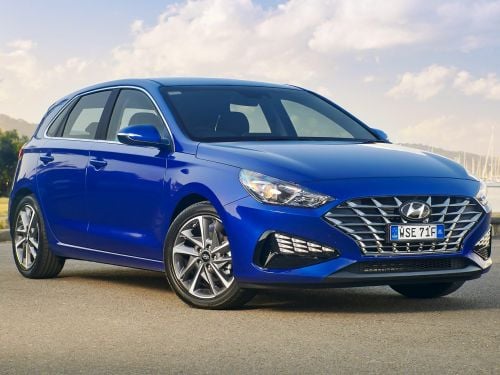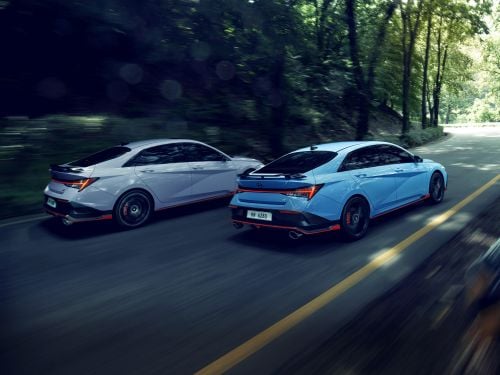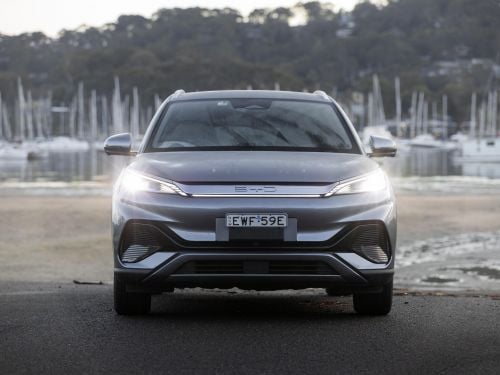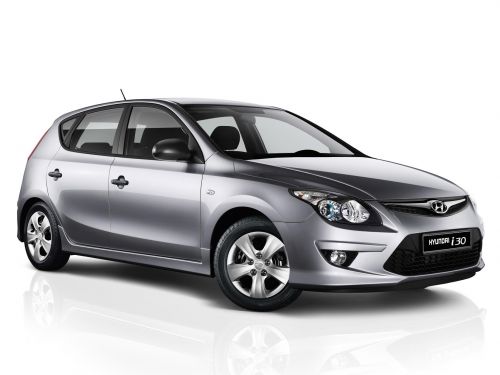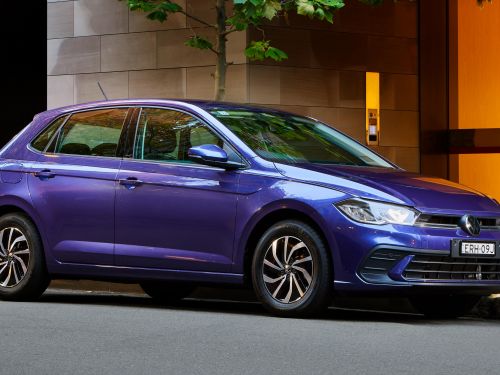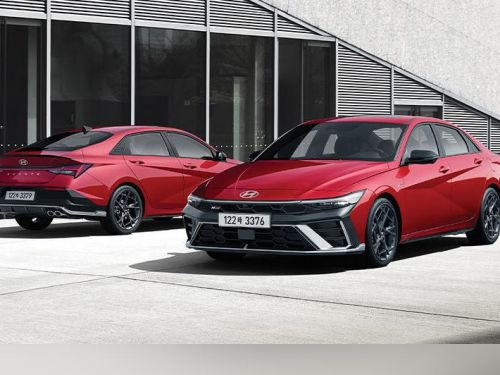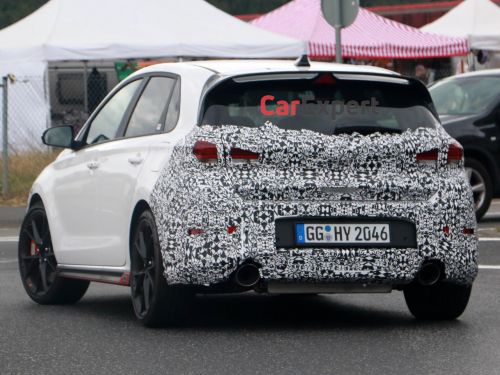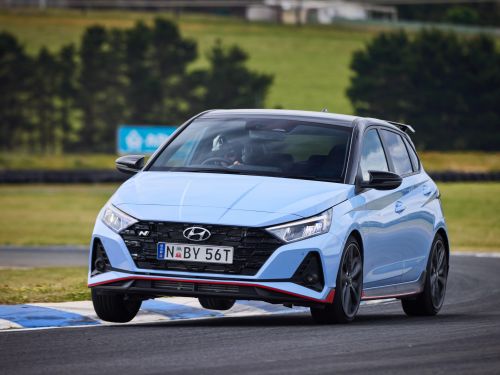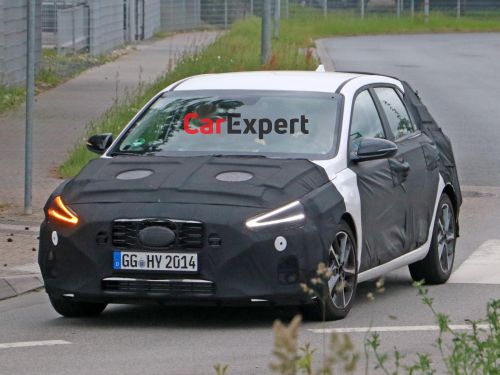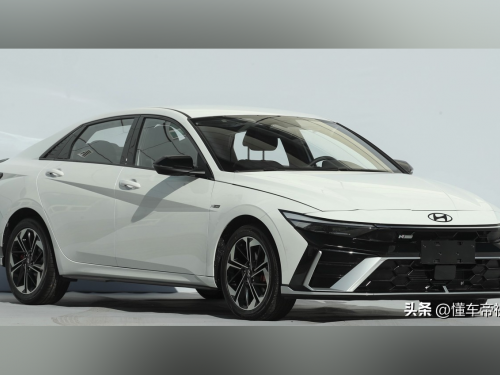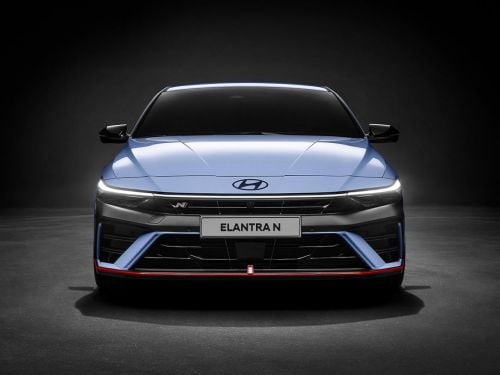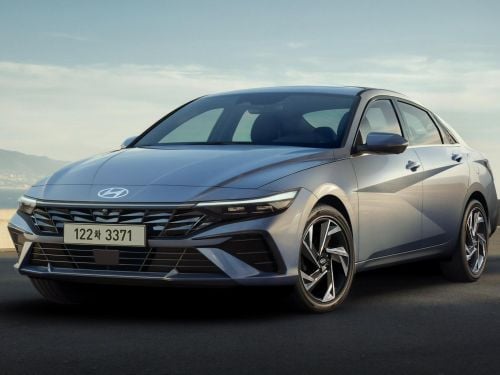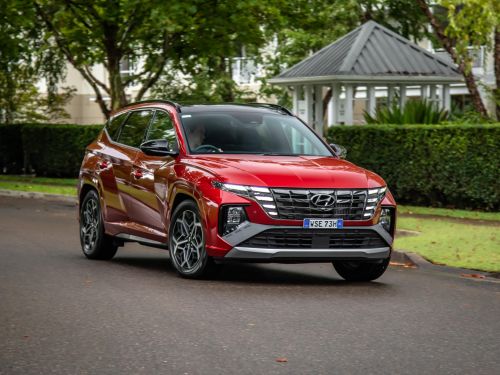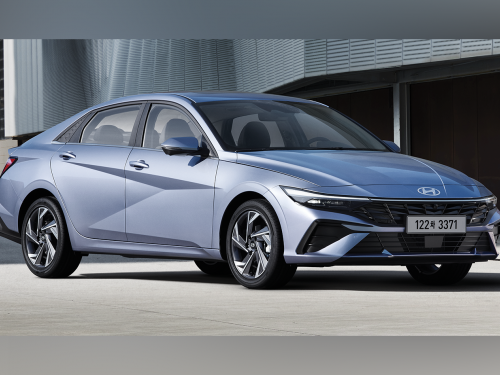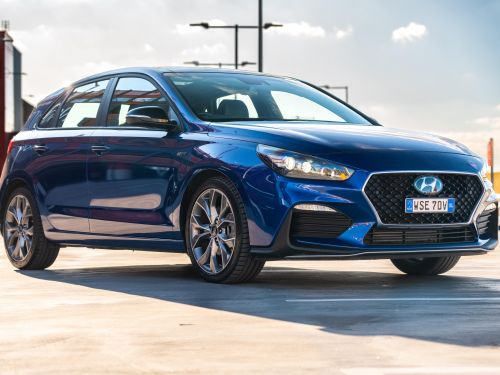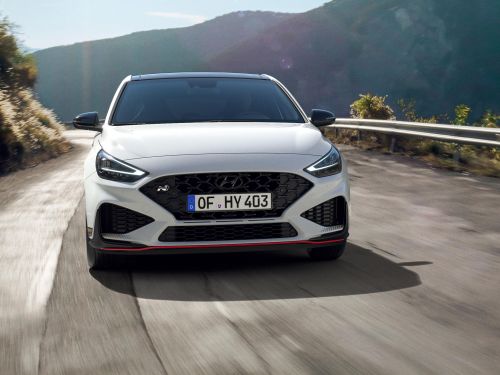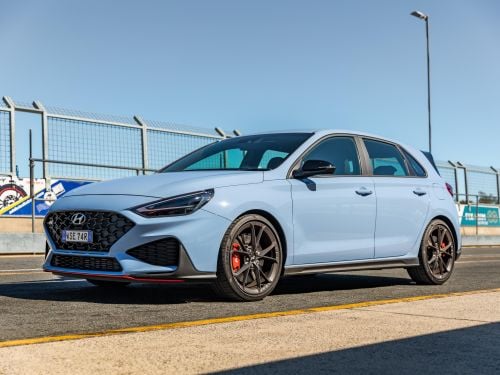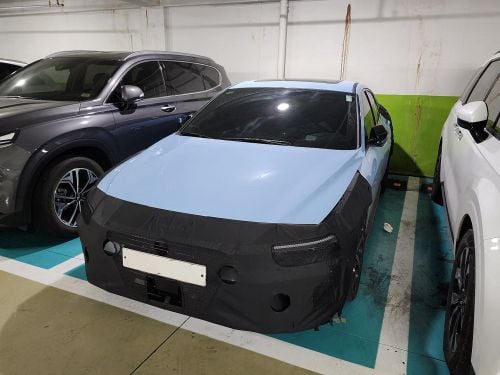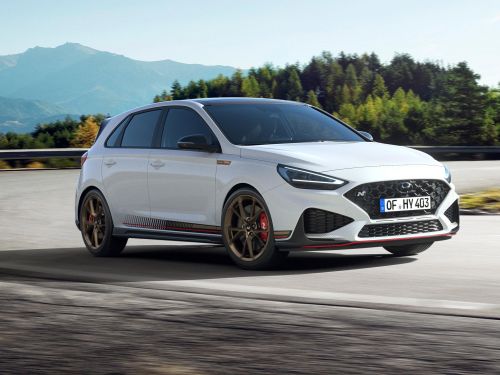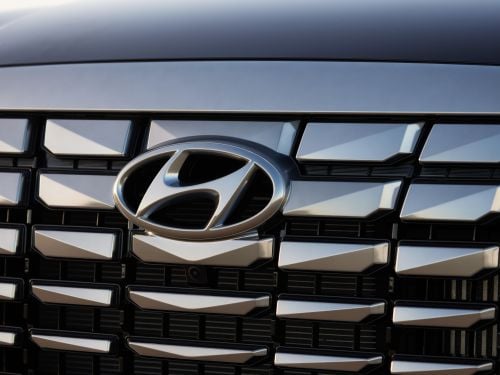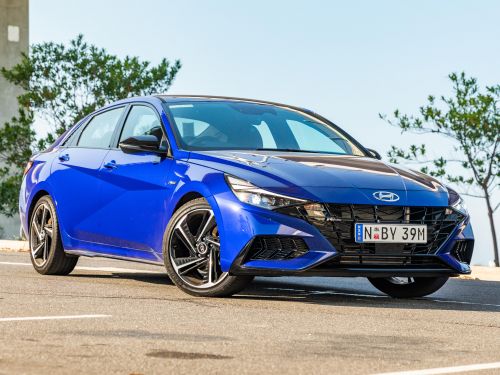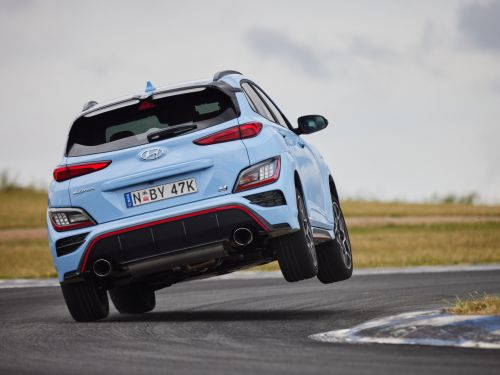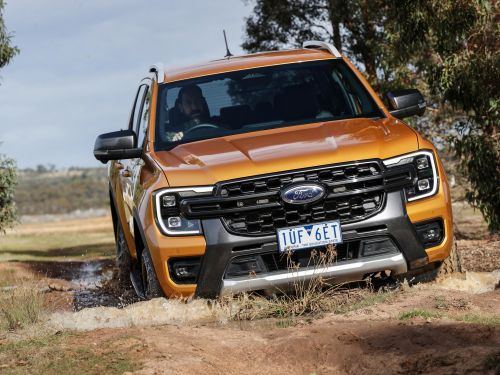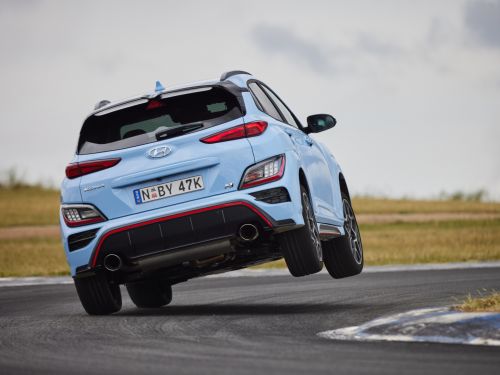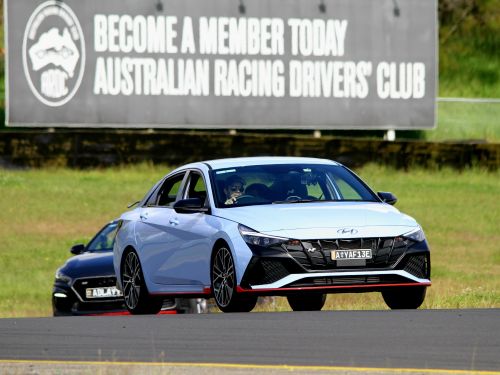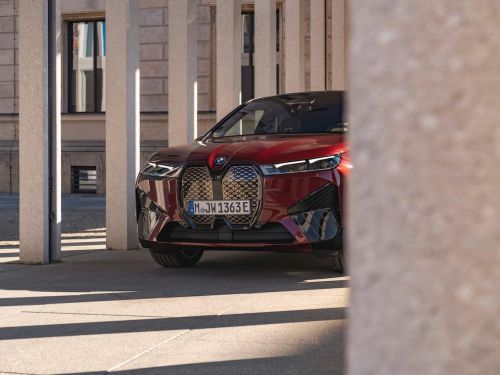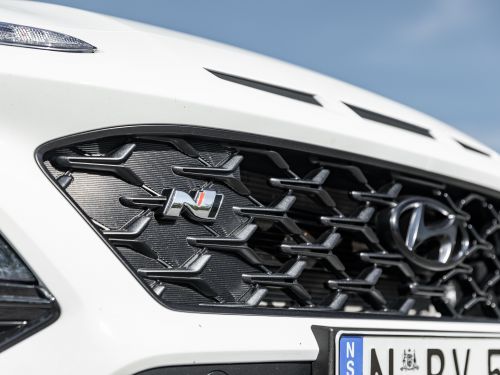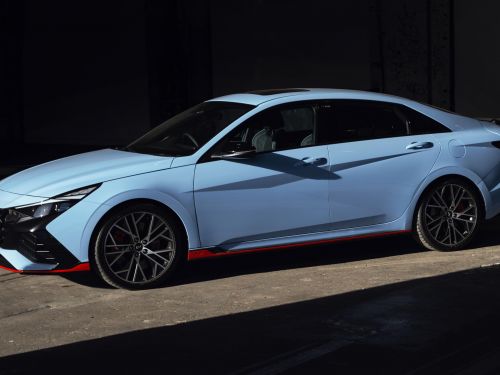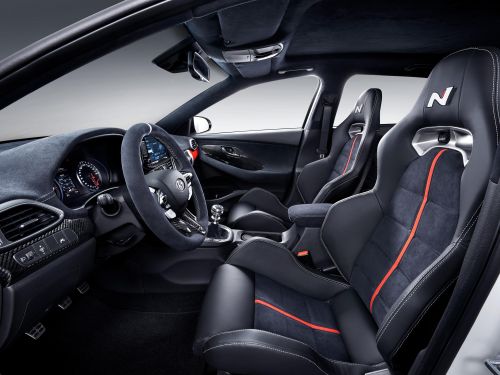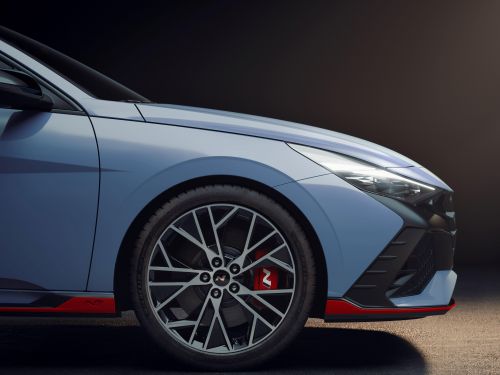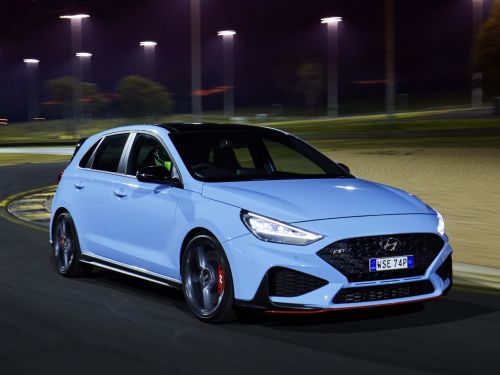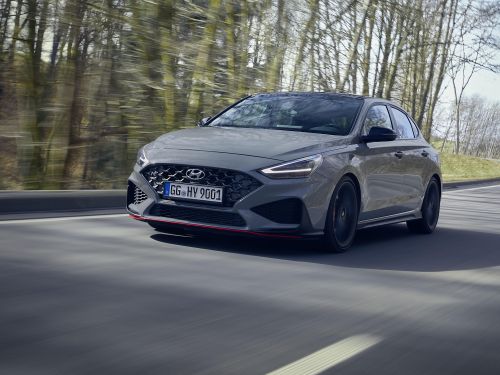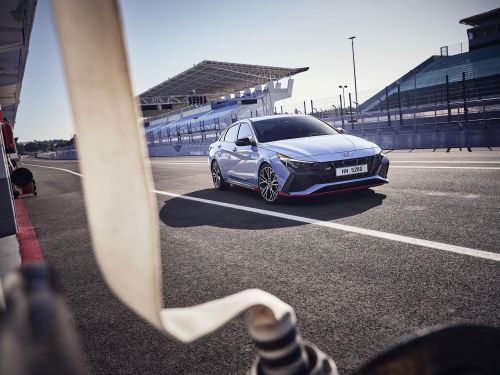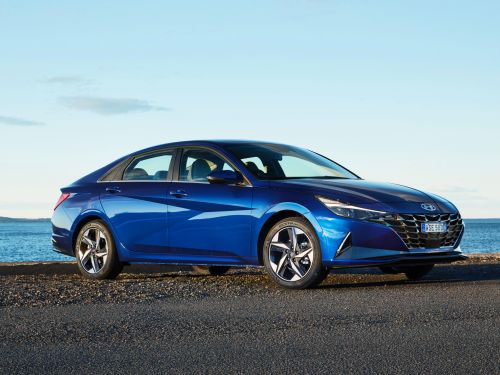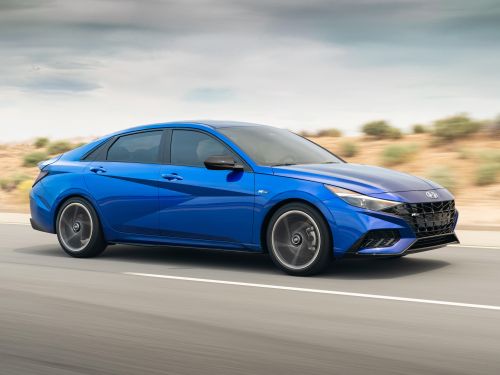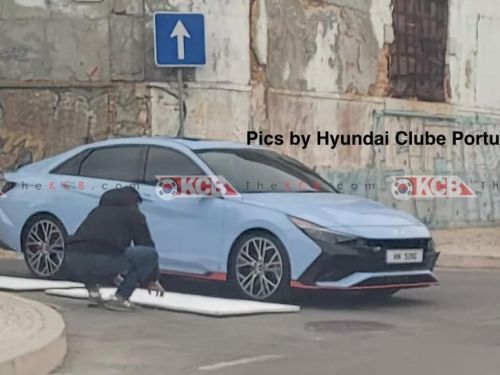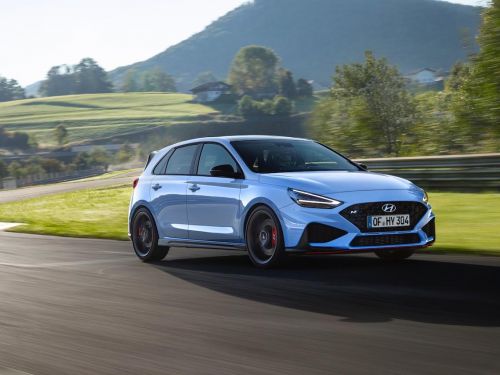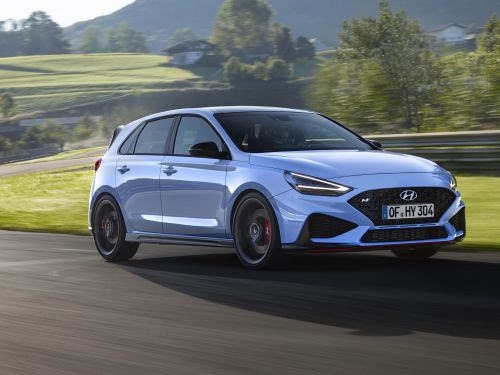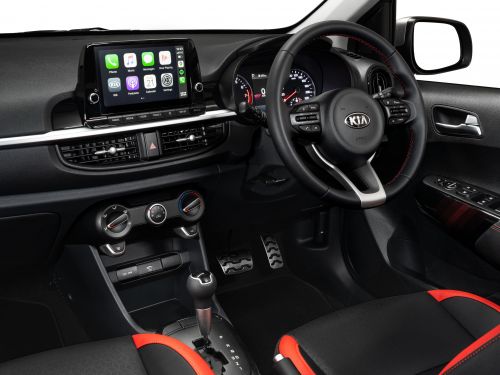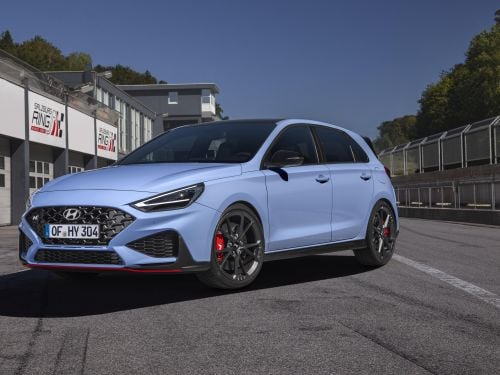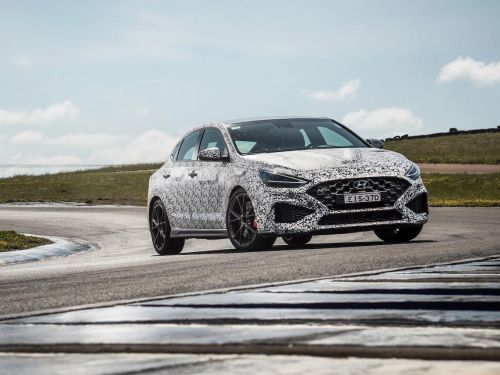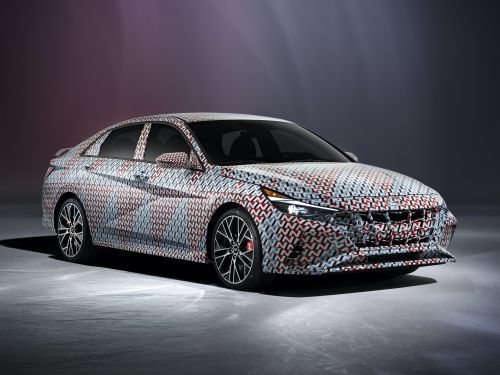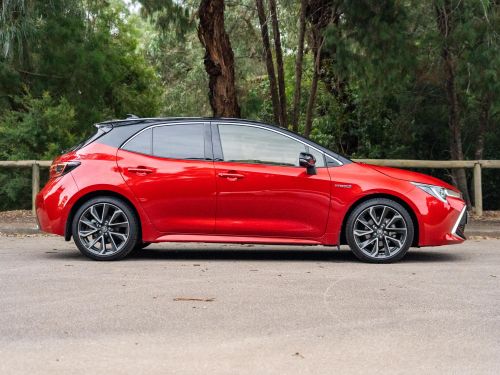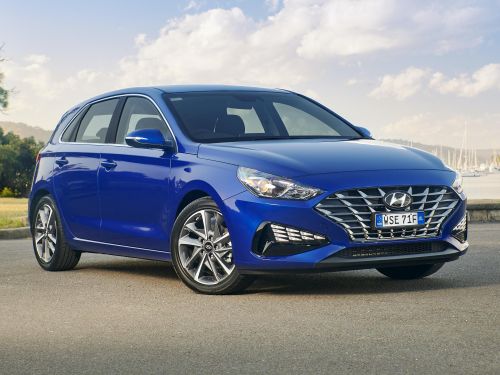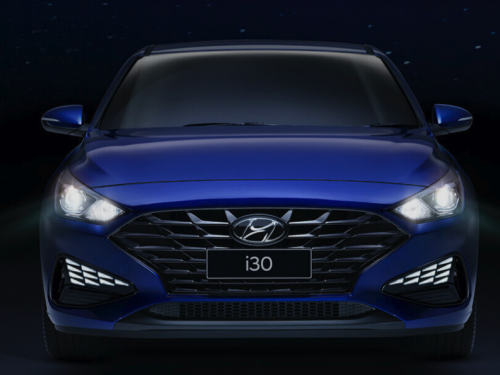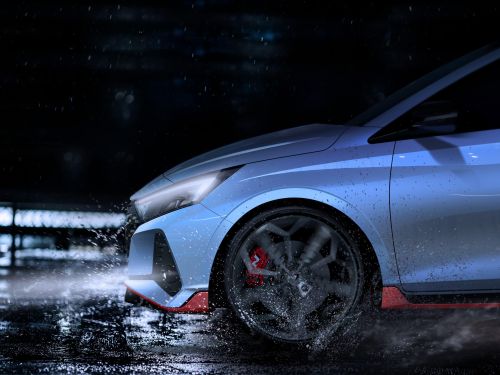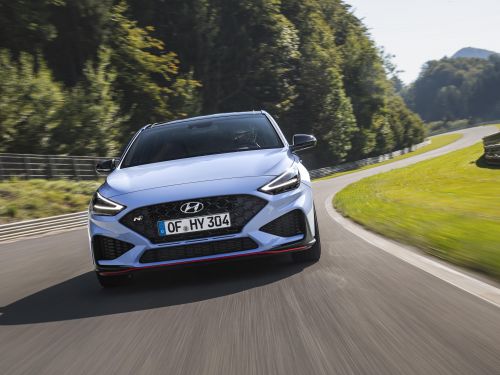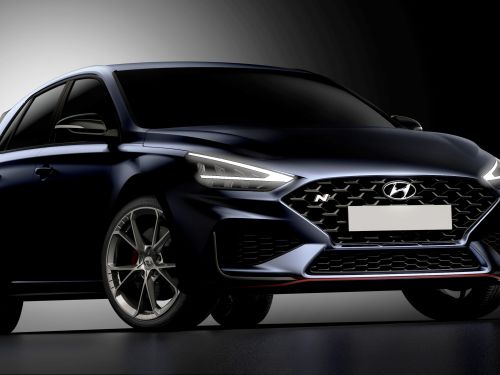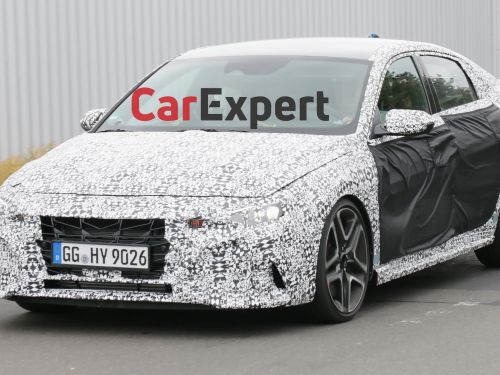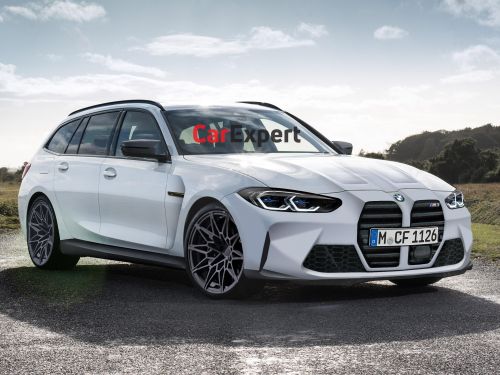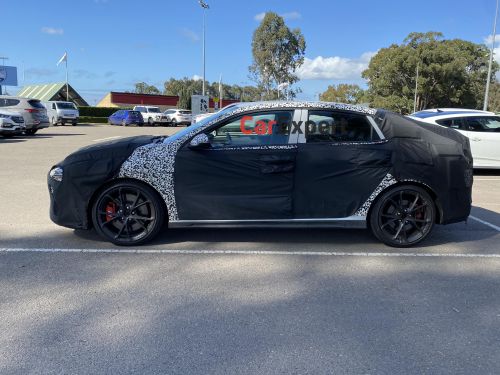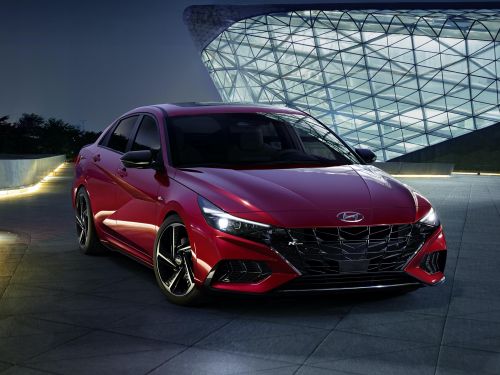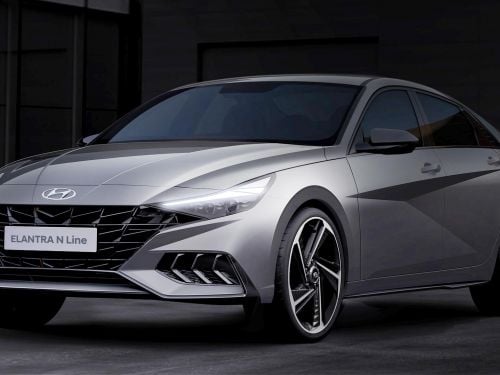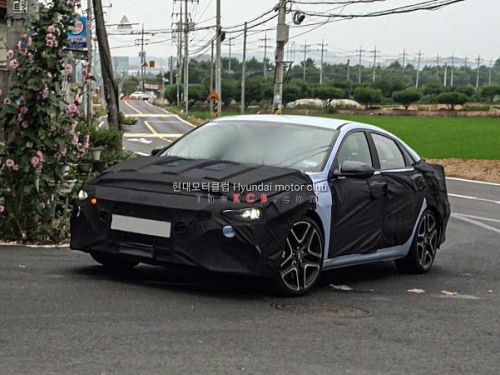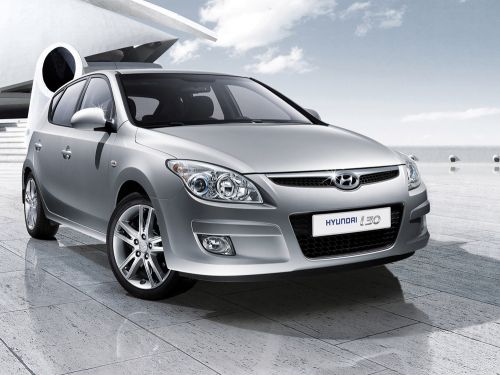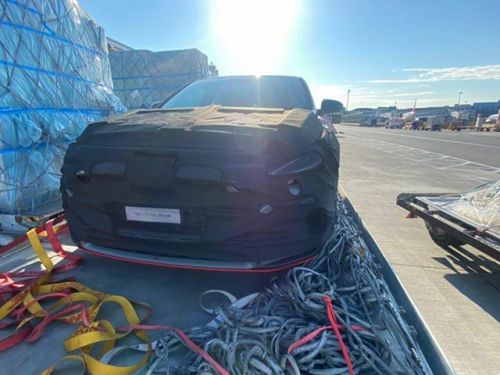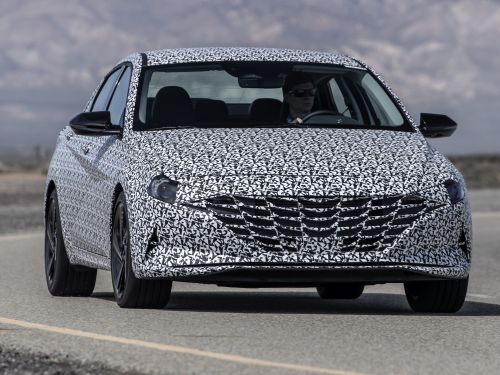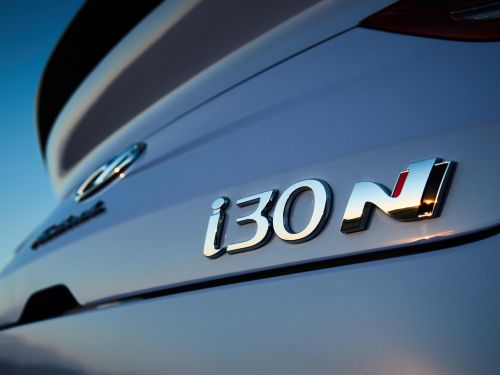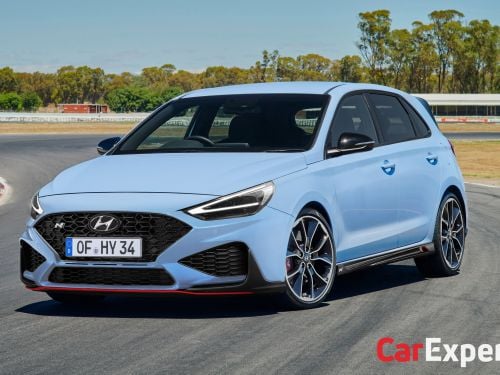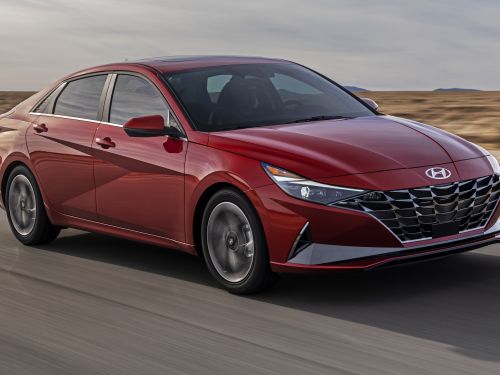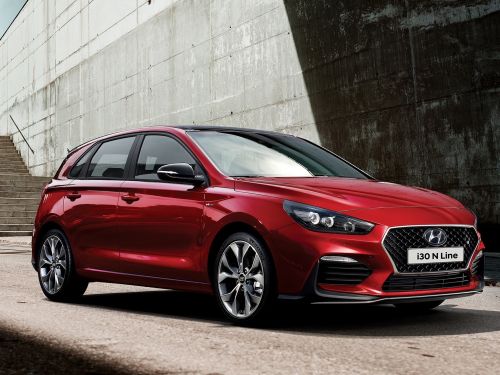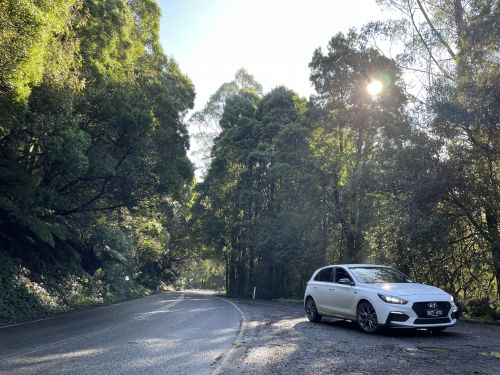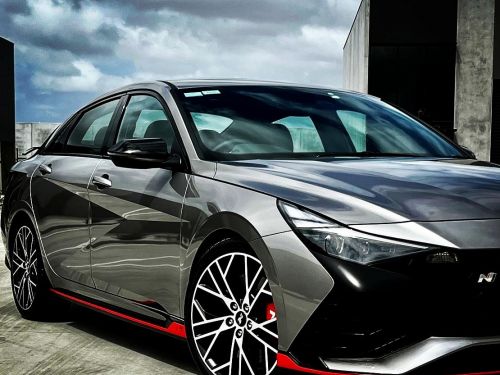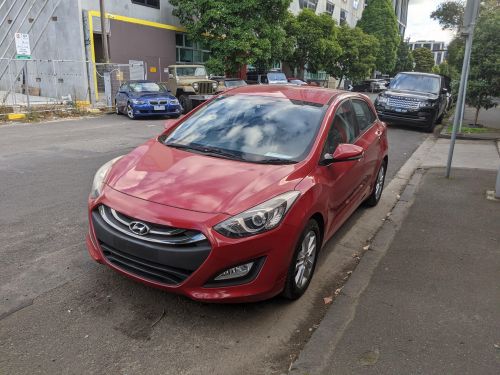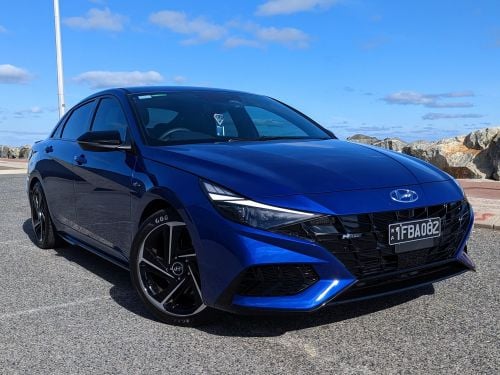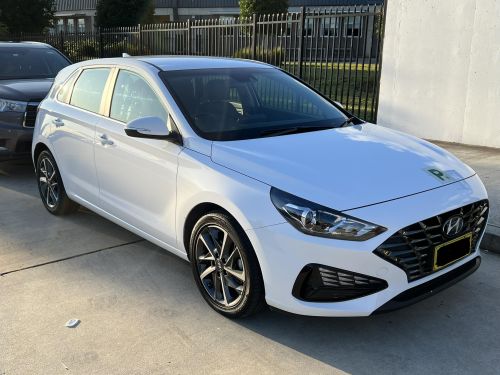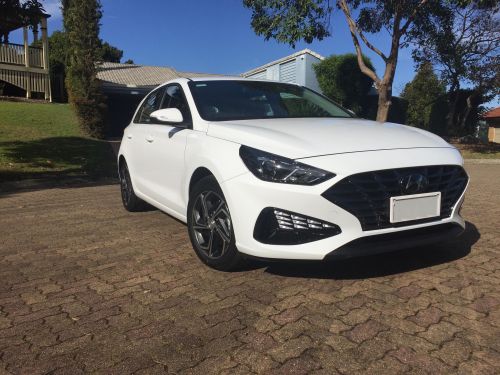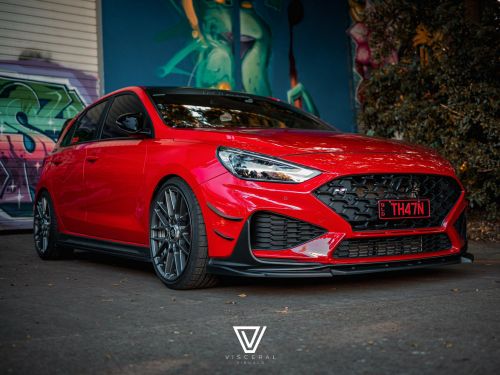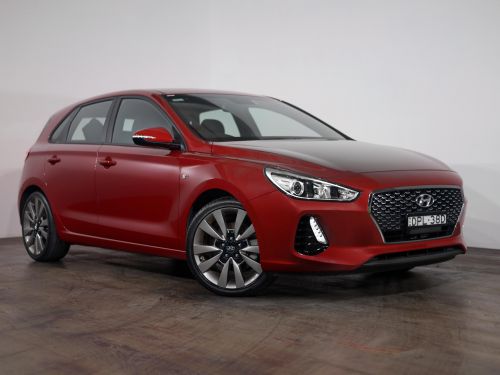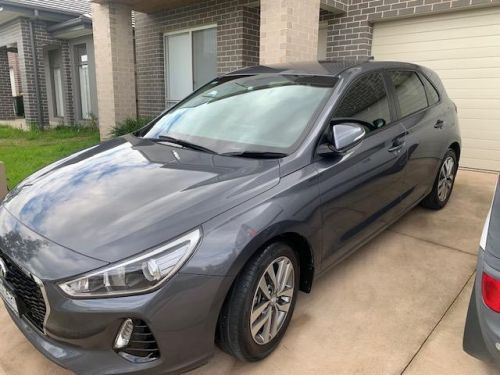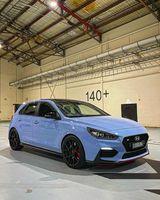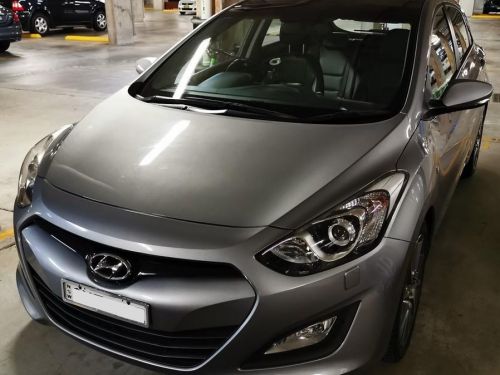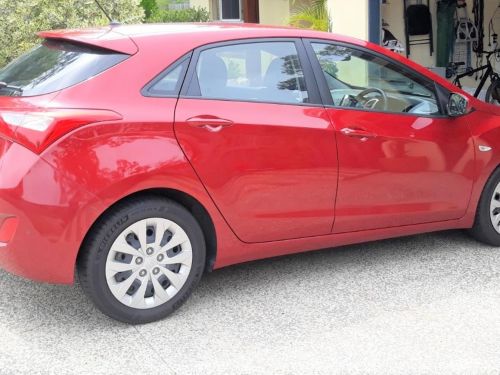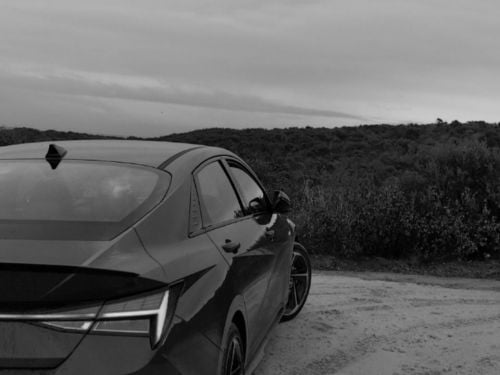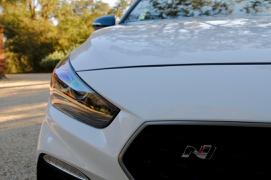
Hyundai i30
About the Hyundai i30
Last updated Oct 11, 2024The Hyundai i30 small car range is one of Australia's top-selling vehicles. There are a myriad of variant and shape options, from hatchback to sedan, and base petrols through to the track-honed i30 N family.
There's something for everyone, even with no wagon available these days.
Video Review
Skip to chapter
Hyundai i30 hybrid (inc. 0-100 & braking) review
The Hyundai i30 has been updated for Australia! It’s now a hybrid, and a lot more expensive than it was. But, is the update any good? Paul Maric gets behind the wheel to find out.
Summary
Myriad variants to choose from
Well-sorted ride and handling
N versions are proper dynamos
Too much tyre noise
1.6 turbo's shorter service intervals
N Line hatches lose some driver-assist features
Price & Specs
Reviews
News
Hyundai i30 Range Guide
Base i30 (hatch only):


- 2.0-litre petrol
- 16-inch alloy wheels
- Full-sized alloy spare
- LED daytime running lights
- Dusk-sensing projector headlights
- Leather-wrapped wheel and shifter
- Cloth seats
- Reversing camera and sensors
- 8.0-inch touchscreen
- Apple CarPlay and Android Auto
- Six-speaker audio
- Manual A/C
- Active cruise control
- Rear vents
Active adds (hatch and sedan):


- Leather-appointed seats
- One touch auto up/down windows
- 17-inch wheels
Elite adds (hatch and sedan):


- Proximity key access
- Button start
- Rain-sensing wipers
- 10.25-inch touchscreen
- Digital radio
- Satellite-navigation
- Infinity-branded audio upgrade (hatch)
- Bose-branded audio upgrade (sedan)
- Wireless charging pad
- Dual-zone climate control
N Line main features (hatch and sedan):


- 1.6-turbo engine
- 18-inch alloy wheels
- Multi-link rear suspension
- Space-saver spare
- Dusk-sensing LED headlights
- Rain-sensing wipers
- Dual-zone climate control
- Michelin Pilot Sport tyres (hatch)
- Goodyear Eagle F1 tyres (sedan)
- Proximity key access
- Alloy pedal caps
- N Line sports gear knob, steering wheel and seats
- LED headlights and tail lights
- N Line body kit
- Paddle shifters for DCT auto
- Reversing camera and sensors
- 8.0-inch touchscreen
- Apple CarPlay and Android Auto
- Six-speaker audio
- Leather-appointed seats
N Line Premium add (hatch and sedan):
- 10.25-inch touchscreen
- Digital radio
- Satellite-navigation
- Infinity-branded audio upgrade (hatch)
- Bose-branded audio upgrade (sedan)
- Glass sunroof
- Powered driver's seat
- Heated and ventilated front seats
- Auto-dimming rear-view mirror
N hot models add (hatch):


- 2.0-litre turbo-petrol
- 19-inch alloy wheels
- Pirelli P-Zero tyres (hatch)
- Michelin Pilot Sport 4S tyres (sedan)
- e-LSD
- Active-valve exhaust
- Unique colours
- Uprated brakes
- Active dampers
- Unique body kit
- Stiffness bar
N Premium models add (hatch and sedan):
- Alcantara and leather-appointed seats (hatch)
- Leather-appointed seats (sedan)
- Auto-dimming mirror
- Heated seats and wheel
- Rain-sensing wipers
- Panoramic glass sunroof (option on manual hatch)
- Glass sunroof (standard on sedan)
Compare









Interior
There are actually some pretty big design differences between hatch and sedan, outside of course – but also inside. These two cars are sold under different nameplates (i30 and Elantra) in various markets, and it shows.
The sedan for example has a larger 10.25-inch digital instrument cluster on high-grade models, next to the hatchback's 7.0-inch display. It also has a more driver-oriented fascia, different door and dash shaping, and even a different grade-specific steering wheel. It's a much more cutting-edge design overall.


Both models offer a decent amount of storage and good build quality, although there's still evidence of cost-saving materials here and there. Both body types offer plenty of adjustability, although the sedan is a little tight on headroom – even though it lacks the hatchback's available panoramic roof.
The 8.0-inch infotainment screen is a decent size, boasts reversing camera footage of a decent resolution, and is flanked by physical shortcut buttons for various functions. There’s also a star button by the screen that you can program as a shortcut – I programmed it to take me to the home screen, as there’s unusually no physical home button.


In terms of storage, there’s a shelf at the base of the centre stack containing the wireless charging pad, while along the centre console there are two cupholders plus a fairly deep bin. The bottle holders in the doors fit 600ml bottles.
For someone 180cm tall, there’s ample legroom behind a front-seat occupant the same size. In fact, there’s a genuinely impressive amount of legroom back here, while the floor is mostly flat.
Rear-seat occupants get air vents, a fold-down centre armrest with cupholders, and bottle holders in the doors large enough for a 600ml bottle, but there are no USB outlets back here.
If you have small children, you can use one of the three top-tether anchor points for a child seat. There are also ISOFIX points for both outboard seats.






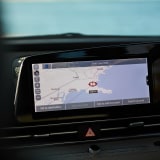







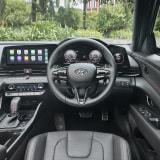
Exterior
Where the hatch looks like a pretty conventional five-door, albeit with a new-design grille and light combination, the sedan is all edges and angles and coupe-like profile. They're very, very different.





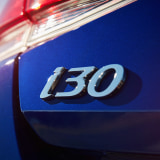









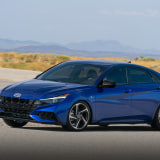







Hyundai i30 Photo Gallery











































Hyundai i30 Colours
Regular i30s:
- Polar White
- Fluidic Metal ($595 extra)
- Amazon Grey ($595 extra)
- Phantom Black ($595 extra)
- Fiery Red ($595 extra)
- Intense Blue ($595 extra)






i30 N models:
- Polar White (both)
- Performance Blue (both)
- Shadow Grey (hatch)
- Engine Red (hatch)
- Phantom Black ($595 extra, both)
- Dark Knight ($595, hatch only)
- Intense Blue $595, sedan only)
- Fiery Red ($595, sedan only)
- Fluid Metal ($595, sedan only)
- Cyber Grey ($595, sedan only)






Cost of Ownership
Service costs vary depending on engine, with your best bet being to pre-pay for five years of servicing.
Base, Active and Elite hatchbacks and sedans with the base 2.0-litre engine have service intervals of 12 months or 15,000km, and come with a five-year service plan costing $1495.
N Line and N Line Premium hatchbacks and sedans with the turbocharged 1.6-litre engine and intervals of 12 months or 10,000km come with a five-year service plan costing $1495, but note the shorter distance intervals.
N and N Premium hatchbacks and sedans with the turbocharged 2.0-litre engine and intervals of 12 months or 10,000km come with a five-year service plan costing $1675.
How it Drives
Base models with the 120kW/203Nm (hatch) or 117kW/191Nm (sedan) 2.0-litre engine and six-speed transmissions are inoffensive motoring, with decent locally-sorted ride and handling balance – with one caveat being mediocre noise suppression.

The N-Line models have a multi-link rear suspension, 150kW and 265Nm turbo engines, and the option of a seven-speed dual-clutch auto with paddles, making them quite consummate warmed-up hatchbacks.
But the superstar models are the proper N cars, with their Nurburgring-honed tuning, adaptive dampers, multi-mode exhausts, massive brakes, LSDs, stiffening braces, variable steering and throttle modes, circuit maps, and track-ready driving modes that relax electronic driver aids.

These are the real-deal. And that's before mentioning the 206kW and 392Nm (more on over boost) turbo engine, and availability of either six-speed manual or new eight-speed DCT.
Hyundai i30 Safety Rating
When the Hyundai i30 hatchback was tested by ANCAP in 2017, it received a rating of five stars.
That rating was based on a frontal offset score of 14.01 out of 16 and a side impact score of 16 out of 16. Whiplash and pedestrian protection were rated Good and Acceptable, respectively.
The i30, Active and N Line grades have:
- Seven airbags
- Driver attention warning
- Camera, radar, car, pedestrian, cyclist AEB
- Active high beam
- Active lane-keeping aid
- Active cruise control (autos)
The Elite alone adds:
- Blind-spot monitor
- Safe Exit Warning
- Rear cross-traffic alert
The sedan hasn't been crashed tested by ANCAP, but features the following:
The Active grade has
- Six airbags
- Driver attention warning
- Camera, radar, car, pedestrian, cyclist, junction AEB
- Active lane-keeping aid
- Active cruise control (autos)
The Elite and N Lines add
- Active blind-spot assist (DCT)
- Blind-spot monitoring (manual)
- Active rear cross-traffic alert (DCT)
- Rear cross-traffic alert (manual)
- Safe Exit Warning
- Active high beam (N Lines only)
Hyundai i30 Options
Metallic or Mica paint, and the sunroof on i30 N models.
Hyundai i30 Warranty
Hyundais come with a five-year, unlimited-kilometre warranty.
Hyundai i30 Stock Availability
By most accounts, supplies of the i30 are relatively good.
Hyundai i30 Boot Space
In terms of boot space, the hatch offers 395L versus 474L for the sedan, although the former has a more user-friendly aperture.


Hyundai i30 Fuel Economy
The 2.0-litre naturally aspirated hatch uses a claimed 7.3-7.4L/100km on the combined cycle, versus 7.1-7.5L/100km for the 1.6T N Lines – all are rated to use cheaper 91 RON unleaded.
The 2.0-litre naturally aspirated sedan uses a claimed 7.0L/100km on the combined cycle, versus 6.8-7.5L/100km for the N Lines.
The 2.0-litre turbo N hatch uses 8.5L/100km on 95 RON, versus 8.2L/100km for the sedan.
Depending on the variant, view the 2024 HYUNDAI I30 fuel usage below.
All Highway, City, and Combined figures below are litres per 100km
| Variant | Series | Style | Fuel Type | Highway | City | Combined | E10? |
|---|---|---|---|---|---|---|---|
| - | PD.V4 MY23 UPDATE | 5D HATCHBACK | UNLEADED PETROL | - | - | 7.3 | Yes |
| - | PD.V4 MY23 UPDATE | 5D HATCHBACK | UNLEADED PETROL | - | - | 7.4 | Yes |
| ACTIVE | PD.V4 MY23 | 5D HATCHBACK | UNLEADED PETROL | - | - | 7.4 | Yes |
| - | CN7.V2 MY25 | 4D SEDAN | UNLEADED PETROL | - | - | 6.1 | Yes |
| N LINE | PD.V4 MY23 | 5D HATCHBACK | UNLEADED PETROL | - | - | 7.5 | Yes |
| ELITE | PD.V4 MY23 | 5D HATCHBACK | UNLEADED PETROL | - | - | 7.4 | Yes |
| N LINE | PD.V4 MY23 | 5D HATCHBACK | UNLEADED PETROL | - | - | 7.1 | Yes |
| HEV 1.6P DCT | CN7.V2 MY25 | 4D SEDAN | PREMIUM UNLEADED/ELECTRIC | - | - | 3.9 | Yes |
| ELITE | CN7.V2 MY25 | 4D SEDAN | UNLEADED PETROL | - | - | 6.1 | Yes |
| N LINE | CN7.V2 MY25 | 4D SEDAN | UNLEADED PETROL | - | - | 6.6 | Yes |
| N LINE MHEV | PDE.V6 MY25 | 5D HATCHBACK | PREMIUM UNLEADED PETROL | - | - | 5.6 | Yes |
| ELITE HEV 1.6P DCT | CN7.V2 MY25 | 4D SEDAN | PREMIUM UNLEADED/ELECTRIC | - | - | 3.9 | Yes |
| PREMIUM | CN7.V2 MY25 | 4D SEDAN | UNLEADED PETROL | - | - | 6.1 | Yes |
| N LINE PRM MHEV | PDE.V6 MY25 | 5D HATCHBACK | PREMIUM UNLEADED PETROL | - | - | 5.6 | Yes |
| N LINE PREMIUM | CN7.V2 MY25 | 4D SEDAN | UNLEADED PETROL | - | - | 6.6 | Yes |
| N PREMIUM | PDe.V5 MY23 | 5D HATCHBACK | PREMIUM UNLEADED PETROL | - | - | 8.5 | Yes |
| N | PDE.V6 MY25 | 5D HATCHBACK | PREMIUM UNLEADED PETROL | - | - | 8.5 | Yes |
| N | PDE.V6 MY25 | 5D HATCHBACK | PREMIUM UNLEADED PETROL | - | - | 8.5 | Yes |
| N PREMIUM | CN7.V2 MY25 | 4D SEDAN | PREMIUM UNLEADED PETROL | - | - | 8.3 | Yes |
| N PREMIUM | CN7.V2 MY25 | 4D SEDAN | PREMIUM UNLEADED PETROL | - | - | 8.5 | Yes |
| N PREMIUM | PDE.V6 MY25 | 5D HATCHBACK | UNLEADED PETROL | - | - | 8.5 | Yes |
| N PREMIUM | PDE.V6 MY25 | 5D HATCHBACK | UNLEADED PETROL | - | - | 8.5 | Yes |
| N PREMIUM WITH SUNROOF | CN7.V2 MY25 | 4D SEDAN | PREMIUM UNLEADED PETROL | - | - | 8.5 | Yes |
| N PREMIUM WITH SUNROOF | CN7.V2 MY25 | 4D SEDAN | PREMIUM UNLEADED PETROL | - | - | 8.3 | Yes |
| N PREMIUM WITH SUNROOF | PDE.V6 MY25 | 5D HATCHBACK | PREMIUM UNLEADED PETROL | - | - | 8.5 | Yes |
| N PREMIUM WITH SUNROOF | PDE.V6 MY25 | 5D HATCHBACK | PREMIUM UNLEADED PETROL | - | - | 8.5 | Yes |
Hyundai i30 Dimensions
The hatch measures 4340mm long, 1795mm wide and 1455mm tall, compared to 4650mm/1825mm/1430mm for the sedan. The sedan also has a 70mm longer wheelbase.
Depending on the variant, the 2024 HYUNDAI I30 measures as below.
| Variant | Series | Style | Length (mm) | Width (mm) | Height (mm) | Wheelbase (mm) |
|---|---|---|---|---|---|---|
| PD.V4 MY23 UPDATE | 5D HATCHBACK | 4340 | 1795 | 1455 | 2650 | |
| PD.V4 MY23 UPDATE | 5D HATCHBACK | 4340 | 1795 | 1455 | 2650 | |
| ACTIVE | PD.V4 MY23 | 5D HATCHBACK | 4340 | 1795 | 1455 | 2650 |
| CN7.V2 MY25 | 4D SEDAN | 4710 | 1825 | 1420 | 2720 | |
| N LINE | PD.V4 MY23 | 5D HATCHBACK | 4345 | 1795 | 1453 | 2650 |
| ELITE | PD.V4 MY23 | 5D HATCHBACK | 4340 | 1795 | 1455 | 2650 |
| N LINE | PD.V4 MY23 | 5D HATCHBACK | 4345 | 1795 | 1453 | 2650 |
| HEV 1.6P DCT | CN7.V2 MY25 | 4D SEDAN | 4710 | 1825 | 1420 | 2720 |
| ELITE | CN7.V2 MY25 | 4D SEDAN | 4710 | 1825 | 1420 | 2720 |
| N LINE | CN7.V2 MY25 | 4D SEDAN | 4710 | 1825 | 1420 | 2720 |
| N LINE MHEV | PDE.V6 MY25 | 5D HATCHBACK | 4340 | 1795 | 1453 | 2650 |
| ELITE HEV 1.6P DCT | CN7.V2 MY25 | 4D SEDAN | 4710 | 1825 | 1420 | 2720 |
| PREMIUM | CN7.V2 MY25 | 4D SEDAN | 4710 | 1825 | 1420 | 2720 |
| N LINE PRM MHEV | PDE.V6 MY25 | 5D HATCHBACK | 4340 | 1795 | 1453 | 2650 |
| N LINE PREMIUM | CN7.V2 MY25 | 4D SEDAN | 4710 | 1825 | 1420 | 2720 |
| N PREMIUM | PDe.V5 MY23 | 5D HATCHBACK | 4340 | 1795 | 1445 | 2650 |
| N | PDE.V6 MY25 | 5D HATCHBACK | 4340 | 1795 | 1445 | 2650 |
| N | PDE.V6 MY25 | 5D HATCHBACK | 4340 | 1795 | 1445 | 2650 |
| N PREMIUM | CN7.V2 MY25 | 4D SEDAN | 4710 | 1825 | 1415 | 2720 |
| N PREMIUM | CN7.V2 MY25 | 4D SEDAN | 4710 | 1825 | 1415 | 2720 |
| N PREMIUM | PDE.V6 MY25 | 5D HATCHBACK | 4340 | 1795 | 1453 | 2650 |
| N PREMIUM | PDE.V6 MY25 | 5D HATCHBACK | 4340 | 1795 | 1453 | 2650 |
| N PREMIUM WITH SUNROOF | CN7.V2 MY25 | 4D SEDAN | 4710 | 1825 | 1415 | 2720 |
| N PREMIUM WITH SUNROOF | CN7.V2 MY25 | 4D SEDAN | 4710 | 1825 | 1415 | 2720 |
| N PREMIUM WITH SUNROOF | PDE.V6 MY25 | 5D HATCHBACK | 4340 | 1795 | 1445 | 2650 |
| N PREMIUM WITH SUNROOF | PDE.V6 MY25 | 5D HATCHBACK | 4340 | 1795 | 1445 | 2650 |
The 2024 HYUNDAI I30 has a braked towing capacity from 1000kg to 1300kg depending on the variant and an unbraked towing capacity from 500kg to 610kg depending on the variant.
Hyundai i30 Market Fit
Both body styles are classified as Small Cars under $40,000, even though the N models exceed this.
Hyundai i30 Sales Data
Hyundai sold 20,626 i30s in 2023, beating its closes rival the Toyota Corolla.
Owner Reviews
Should you buy the Hyundai i30
From a cheap rental base to a track-honed dynamo, the range has you pretty covered. The only real missing areas are the lack of a hybrid to match the Corolla, and lack of a wagon.
Competitor Analysis
The i30's strength lies in its diversity: there's almost something for everyone, save the lack of a wagon.
It's more spacious than a Toyota Corolla, and offers more performance from the option of 1.6 and 2.0-litre turbo engines. The Corolla counters by packing a frugal hybrid option, however.
Hyundai i30 Interesting Facts
Ex BMW M chief Albert Biermann led development of the i30 Ns at Germany's Nurburgring.
Frequently Asked Questions
Enquiring through CarExpert is one of the easiest ways to order a new 2024 Hyundai i30. We connect you with an accredited dealer/s and equip you with information on current deals, what others have paid, plus, our independent reviews and ratings. You can also call our friendly Concierge team whenever you need support - they remain on hand throughout the process to ensure you get the service (and value!) we demand of our partnered dealers.
When you buy a new 2024 Hyundai i30 through CarExpert, speed, confidence and great value come standard.

